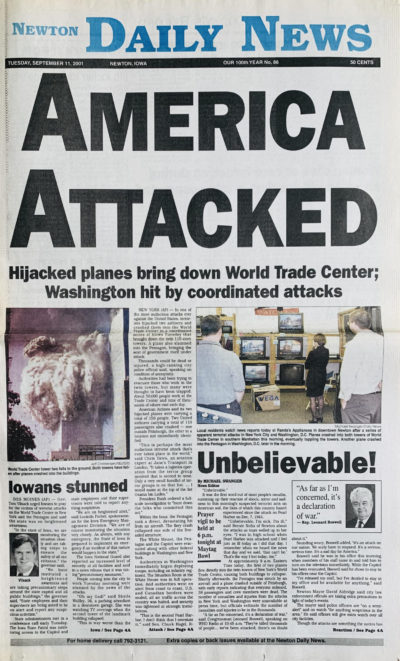
By Michael Swanger
Where were you on Sept. 11, 2001?
If you are old enough to remember the horrific events of that infamous day, most likely you will never forget it. Nor will I.
That Tuesday morning I was at my desk in the newsroom of the Newton Daily News, where I served as news editor. One of my daily tasks was to review numerous online stories from The Associated Press Newswire to fill the back pages of the “A” section of each afternoon’s edition of the newspaper.
At approximately 9:50 a.m. a news alert flashed across the Newswire: “Plane crashes into World Trade Center, according to television reports.”
I mentioned it to the editor and kept scrolling.
About 15 minutes later, another bulletin popped up with urgency in the slug line: “A second explosion has rocked the World Trade Center.”
That prompted the staff to roll a television into the newsroom where — like millions of people — we watched in disbelief the live coverage of the Twin Towers burning and their eventual collapse, as well as the haunting videos of the two hijacked airplanes crashing into the upper floors of the Twin Towers. They were the first and most powerful flashbulb memories of the day for our nation.
Sadly, they would not be the last.

Front page of the Newton Daily News, Sept. 11, 2001.
Within about an hour’s time, the Newswire reported that a third plane crashed into the Pentagon and that a fourth plane headed for Washington crashed into a field in Somerset County, Penn., due to the heroic efforts of its passengers and crew who overwhelmed the plane’s hijackers. As we would later learn, it was 19 terrorists associated with al-Qaeda, an Islamist extremist group, who hijacked those four commercial airplanes that morning on the East Coast in a coordinated attack that killed 2,977 people. It was the single largest death toll resulting from a foreign attack on U.S. soil.
As deadline loomed, with notebook and camera in hand, I walked to Newton’s downtown square where a group of citizens had congregated at a local appliance store to monitor the latest news on its display televisions. I gathered quotes from a number of residents and officials for a front page story, but one stood out to me.
“Unbelievable. I’m sick. I’m ill,” Bernie Nolin of Newton said with tears in her eyes. “I was in high school when Pearl Harbor was attacked and I feel just as ill today as I did that day.”
After filing my story and putting the newspaper to bed, I hurried home for a quick lunch. There, I turned on the television and heard Newton resident Rhonda McCleary tell a Des Moines station that her stepfather, Newton resident Jim Cleere, was at the Marriott Hotel next to the Twin Towers on a business trip when the planes crashed into them.
Later that afternoon, with notebook in hand and an acute sensitivity to the gravity of the situation and their privacy, I was sitting in Jim’s living room with his wife, Jean Cleere, and McCleary. Graciously, they allowed me to join them while they closely watched television coverage of New York City hoping to catch a glimpse of Jim. Additionally, they played for me the voice message Jim left for Jean after the first plane crashed into the Twin Towers telling her he was “OK.” Jean also said that she spoke to her husband again about the time the second plane crashed into the Twin Towers, assuring her he would “stay out of danger until they tell me where to go.”
“He had a quiver in his voice, but he was very business-like and said, ‘I’ll be coming home as soon as I can,’” Jean said. “I told him ‘I love you, please take a bus. Please come home soon,’ and we said good-bye. I haven’t heard anything since.”
Sadly, Jean would never speak to Jim again, nor would his body be recovered.
That evening, about 500 Newton residents attended a vigil service quickly organized by local religious leaders at the Maytag Bowl. The shared grief and faith displayed at the non-denominational event was a powerful reminder of how unified our citizenry was on 9/11.
The vigil was my final assignment on that pivotal day in U.S. history which none of us will forget. It would set the tone for the days and weeks ahead in which I was humbly entrusted by Jim’s family to tell his story and theirs.
Each year on 9/11 I think of Jim and his family. As we recognize the 20th anniversary of 9/11, let us never forget those who died and their loved ones.
TO READ MORE FASCINATING STORIES ABOUT IOWA HISTORY, subscribe to Iowa History Journal. You can also purchase back issues at the store.
